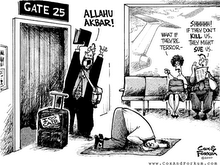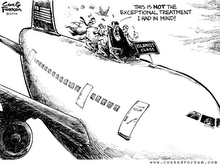WASHINGTON--Politicians on Thursday said the U.S. government must do more to counteract propagandizing by al Qaida and radical terrorist groups on the Internet.
Leaders of the Senate Committee on Homeland Security and Governmental Affairs said they're troubled that extremists are increasingly flocking to the Web to recruit, organize, conduct online courses, raise funds and plan attacks in a manner that's cheaper and speedier than ever before.
"We cannot cede cyberspace to the Islamist terrorists because if we do, they will successfully carry out attacks against us in our normal environment," Committee Chairman Sen. Joseph Lieberman (I-Conn.) said at a morning hearing here titled "The Internet: A Portal to Violent Islamist Extremism."
Sen. Susan Collins (R-Maine), the committee's co-chairman, spoke of the need to "resist the perversion of the World Wide Web into a weapon of worldwide war."
The use of the Internet by terrorist groups is hardly a new phenomenon. But according to the hearing's witnesses, the number of Web sites--many of them mirroring information published by leaders on core, authoritative sites--has multiplied from a handful in 2000 to many thousands today, with more added each week. Most of the 42 groups on the State Department's 2005 list of foreign terrorist organizations use Web sites "to promote their violent message," Collins said.
Officials from the U.S. Army and the Department of Defense and the co-author of a new report on "Internet-facilitated radicalism" told politicians at the hearing that it's clear the preferred locale for the "war of ideas" perpetuated by terrorist groups is a new cyberbattlefield.
"The Internet...is more than just a tool of terrorist organizations," said Michael Doran, a deputy assistant secretary in the Defense Department. "It is the primary repository of the essential resources for sustaining the culture of terrorism."
The latest generation of radicals is using password-protected bulletin boards to exchange ideas, translating their video and audio tapes into various foreign languages, and employing readily available services like Google Earth to scheme up targeted attacks, the witnesses said. Some sites have become virtual libraries, housing thousands of electronic books and articles written by members of a global movement bent on waging war against the United States and its worldwide allies.
"Internet chat rooms are now supplementing and replacing mosques, community centers and coffee shops as venues for recruitment and radicalization by terrorist groups like Al-Qaida," said Frank Cilluffo, director of the Homeland Security Policy Institute at George Washington University. He co-authored a report released Thursday (PDF) that details the use of the Internet by radical groups, some of whom live by the slogan "keyboard equals Kalashnikov."









No comments:
Post a Comment